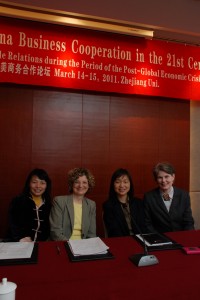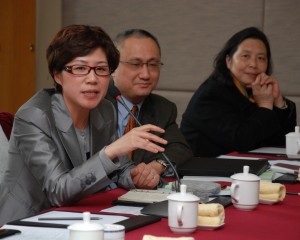An Entrepreneurial Spirit

Left to right, entrepreneur Lydia Hu, IU Kelley School associate dean Idalene Kesner, entrepreneur Rachel Gong, and IU Kelley School professor Tricia McDougal
There is a 12-hour time difference between Shanghai and the Midwest, but the connections between Indiana and this part of the world are getting closer.
During our week, we met several successful people developing new businesses in China, and many were Indiana University alumni or those who had been based at Indiana companies for many years.
That trend appears like to continue. The number of students from China at IU Bloomington increased 57 percent between 2009 and 2010. Since 2006, that increase has been more than 300 percent, from 386 to 1,582. China also is a top country of origin for international students at IUPUI.
Among these IU alumni in China is Lydia Hu, who eight years ago graduated from IU’s Kelley School of Business with an MBA degree. Today, she leads own Shanghai-based high-tech company, TrueConvergence Co. Ltd.
“One of the good characteristics of private entrepreneurs in China is that they always start from zero and they’re always very persistent,” said Hu, whose company manages in-room services for guests staying at luxury hotel chains in China such as Hyatt and InterContinental. She formed it little over three years ago.
Hu, who grew up in China, was one of the last speakers at the joint conference on U.S.-China business cooperation organized by IU and Zhejiang University. She was a presenter at the conference’s second day program about entrepreneurship in China.

Wu Delong, left, president of the Commerce and Trade Association of Zhejiang Province, makes a point during a panel discussion on entrepreneurship
“It’s not only my dream but also the responsibility of the people in my generation … to help China to grow,” Hu said through an interpreter. “There’s already significant infrastructure and opportunities here and it’s already become possible for people like me.
“It is very important, critical, for China to have its own famous brand,” she added. “That’s something that I want to help China to achieve.”
Benjamin Shobert, a Hoosier and managing director of Teleos Inc., noted that going back to the 1980s Chinese entrepreneurship has “been formative in moving the country forward politically.”
Hu and other presenters outlined the ongoing challenges that many people face in establishing private enterprises.
Some people, such as panelist Ling Lanfang, chairman of Hangzhou-based Silk Road Holding Group, complained of intrusive, if not discriminatory, public sector involvement.
Other panelists also expressed concern about increasing tax rates and confining employment laws for Chinese firms, as well as a central concept in Chinese society, the personal network, “guanxi,” which many critics suggest leads to corruption.
One American participant noted informally afterwards that the debate that morning had a similar ring to the one now taking place in Congress and at state houses in Indiana and Wisconsin.

Researchers work in a lab at Crown BioScience, which does early-stage drug testing for U.S. pharmaceutical companies
During the week, we also met Joe Shih, executive vice president at Crown Bioscience, who retired from Eli Lilly & Co. after a 25-year career in product development at the drug maker. His family still resides in Carmel, Ind. The firm does early-stage drug development for major U.S. pharmaceutical companies.
We also met with executives and toured the factory at Cummins Filtration China, a subsidiary of the Columbus, Ind.-based Fortune 500 company. All spoke warmly of their visits to Cummins’ headquarters at the city called “The Athens of the Prairie.”
More than 150 turned out for a Friday-night reception with IU alumni in the Shanghai area, local friends of the Research Center on Chinese Politics and Business and Kelley School students who also spent a week in the area.
One recent IU graduate who joined us at the conference and reception has relocated to Shanghai in hopes of finding his first job here. He’s saved enough money to stay for three months, and hopefully much longer if he is successful.
While many Americans have expressed concerns for China’s ever increasing economic might, the motives of many involved with business start-ups here are similar to their U.S. counterparts. Shobert may have summed things up best:
“Entrepreneurs take a simple approach. It’s a way of accessing new markets, but ultimately there’s a lot of commonality in how those interests line up,” said Shobert, who writes a regular column on U.S.-China relations for Asia Times. “Entrepreneurship at its best is an opportunity to answer the question that both countries have, which is, ‘how do we better ourselves.
“What does our future look like if we don’t have an incentivized entrepreneurial class,” he added. “Entrepreneurship, like any human endeavor has a darker side I suppose, and that’s it can reduce each one of us to a market — everyone in this room to a commercial transaction, to a profit dollar.
“I’m struck this morning that regardless of whether we’re talking about entrepreneurship in China or the United States, there’s a lot more that we have in common, than what we have as differences,” he said. “We’re at a very interesting point where entrepreneurship in both countries serves the interests not just of making sure that we’re talking to one another productively, but that domestically we’re continuing to evolve practices and reforms that allow us to be productive in the 21st Century.”
No Comments
No comments. Be the first.
Sorry, the comment form is closed at this time.

